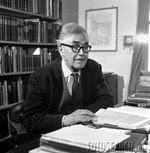****
UPDATE:
At the request of one of my readers here's a list (in alphabetical order) of the authors of the following quotes. I'll link the authors to the actual quotes in a day or so.
Karl Barth - Sarah Coakley- Gustavo Gutiérrez - Robert Jenson - Elizabeth Johnson - James McClendon - Wolfhart Pannenberg - Dorothee Sölle - C.S. Song -
Medi-Ann Volpe
****
UPDATE 2:
So, all is now revealed.
****
UPDATE 2:
So, all is now revealed.
****
 |
| Sarah Coakley |
 |
| James McClendon |
Theology means struggle.
Thus the real results of dogmatics, even though they have the form of the most positive statements, can themselves only be new questions, questions to and fro between what the Church seems to proclaim and the Bible seems to want proclaimed, questions which can be put only with the greatest modesty and a sense of supreme vulnerability if they are perhaps serious and significant questions.
Karl Barth
 |
| Gustavo Gutiérrez |
 |
| Dorothee Soelle |
But can there be any Logos, any systematic and rational clarification, of God? If theology were simply a 'theory about God', analogous to ossology (the theory of bones), then it would be an insult to God, blasphemy. The object of theology can only be the relationship between God and human beings: in other words, reflection on the experiences that have compelled human beings to talk about something like 'God'.
 |
| Robert Jenson |
 |
| Elizabeth Johnson |
Rooted in the Christian tradition and equipped with scholarly tools, those of us in the theological guild think about the meaning of faith and the way it is practiced. The purpose is to shed more light on the gospel, so it can be lived out with deeper understanding and vibrant love of God and neighbour.
 |
| Medi Ann Volpe |
The riches of the imagination can aid the task of discipleship, but in order to do so, the imagination itself must be trained by doctrine to nourish hope, encourage perseverance in faith and demonstrate the love in which Christians participate as members of Christ. Doctrine is a gift of the rationally capacious to structure our imaginations according to Christian hope.
 |
| C.S.Song |
For most Christian faith traditions and schools of Christian theology, the question of God is the beginning point. And yet, when we think of the whole more deeply, we may realize that this time-honoured way of doing theology parts company with the methods of science and technology. Science seeks to discover what is presently unknown by the study of what is known. God is a great unknown. To begin with God, therefore, is to attempt to explain what is known by what is not known, quite the opposite of how science proceeds. Rather we should begin where we are with what can be known through our experience in the world and see where it take us.
 |
| Wolfhart Pannenberg |
Dogmatics as systematic theology proceeds by way of both assertion and hypothesis as it offers a model of the world, humanity, and history as they are grounded in God, a model which, if it is tenable, will 'prove' the reality of God and the truth of Christian doctrine, showing them to be consistently conceivable and also confirming them, by the form of presentation. In this way dogmatics expounds the truth claim of Christian teaching. it shows how this teaching must be understood in context if it is to be accepted as truth.

2 comments:
Thanks Geoff! Before giving us the 'answers' to who penned those perspectives could you consider giving us the list of sources so that we can try to match author and quote? Al.
OK. But I'll wait 24 hours before I list the authors! I'll let the possibilities ferment a bit longer:)
Post a Comment